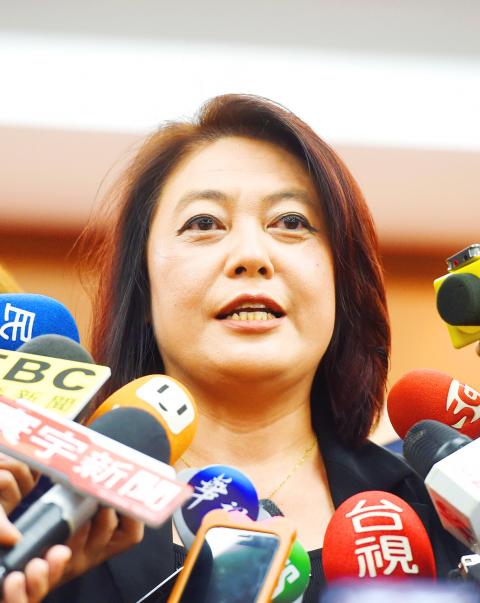National Communications Commission (NCC) Chairwoman Nicole Chan (詹婷怡) yesterday tendered her resignation to Premier Su Tseng-chang (蘇貞昌), who approved it last night.
“I have cherished every day at the commission since I took office in August 2016. I have worked hard to execute my duties under the framework of the Fundamental Communications Act (通訊傳播基本法) and the National Communications Commission Organization Act (國家通訊傳播委員會組織法),” she wrote on Facebook.
Chan also thanked President Tsai Ing-wen (蔡英文) and NCC Deputy Chairman Wong Po-tsung (翁柏宗), as wells as commissioners and agency staff for their support and efforts.

Photo: Fang Pin-chao, Taipei Times
Her resignation came after Su and Democratic Progressive Party (DPP) lawmakers last month accused the NCC of failing to curb the spread of misinformation, which they said almost caused DPP Legislator Kuo Kuo-wen (郭國文) to lose a legislative by-election in Tainan.
Chan also came under scrutiny after a person who claims to be an NCC staffer told the local Chinese-language media that she attended events unrelated to the commission’s work and asked staffers to prepare presentations for the events.
Chan said that she has been a pioneer and practitioner of the vision for a “beautiful and digital” Taiwan, because it involves the nation’s development in the post-digital convergence age and would determine whether it could evolve into a more profound democracy.
She does not fear the unknown or facing difficulties, and addresses challenges by working with like-minded people, she said.
“I truly believe that what the nation needs right now is a wake-up call, and all of us should work hard to reduce tensions between political groups, change the mindset, set up common goals that benefit all and enhance the efficiency of governance. Only by doing so can the nation avoid the pitfalls of a democratic system and digital development. This requires great wisdom,” Chan said.
She said she would continue to fight for Taiwan with the same conviction regardless of where she is or in which capacity she serves.
Her tenure was originally set to end on July 31 next year, the commission said.
Chan, 51, received a bachelor’s degree in law from National Taiwan University and a master’s degree in intellectual property laws from the University of London.
Before serving as NCC chairwoman, Chan was the director of the Science and Technology Law Institute.
She was also an executive producer of the film Dragon Dance (龍飛鳳舞) and a producer of the film Seven Days in Heaven (父後七日).
In 2016, Chan was nominated by former premier Lin Chuan (林全) and approved by the Legislative Yuan to lead the commission, becoming its first non-academic chairperson.
Her father, Chan Yi-chang (詹益彰), was a Control Yuan member and a prominent figure in the Chinese Nationalist Party (KMT).
Chan is also viewed as being close to pan-green camp politicians.

ACTION PLAN: Taiwan would expand procurement from the US and encourage more companies to invest in the US to deepen bilateral cooperation, Lai said The government would not impose reciprocal tariffs in retaliation against US levies, President William Lai (賴清德) said yesterday, as he announced five strategies to address the issue, including pledging to increase Taiwanese companies’ investments in the US. Lai has in the past few days met with administrative and national security officials, as well as representatives from various industries, to explore countermeasures after US President Donald Trump on Wednesday last week announced a 32 percent duty on Taiwanese imports. In a video released yesterday evening, Lai said that Taiwan would not retaliate against the US with higher tariffs and Taiwanese companies’ commitments to

‘SPECIAL CHANNEL’: Taipei’s most important tasks are to stabilize industries affected by Trump’s trade tariffs and keep negotiations with Washington open, a source said National Security Council Secretary-General Joseph Wu (吳釗燮) arrived in the US for talks with US President Donald Trump’s administration, a source familiar with the matter said on Friday. Wu was leading a delegation for a meeting known as the “special channel,” the Financial Times reported earlier. It marked Trump’s first use of the channel since returning to the White House on Jan. 20. Citing a source familiar with the matter, the Financial Times reported that Minister of Foreign Affairs Lin Chia-lung (林佳龍) was also a part of the delegation. The visit came days after China concluded war games around Taiwan and amid Trump’s

Intelligence agents have recorded 510,000 instances of “controversial information” being spread online by the Chinese Communist Party (CCP) so far this year, the National Security Bureau (NSB) said in a report yesterday, as it warned of artificial intelligence (AI) being employed to generate destabilizing misinformation. The bureau submitted a written report to the Legislative Yuan in preparation for National Security Bureau Director-General Tsai Ming-yen’s (蔡明彥) appearance before the Foreign Affairs and National Defense Committee today. The CCP has been using cognitive warfare to divide Taiwanese society by commenting on controversial issues such as Taiwan Semiconductor Manufacturing Co’s (TSMC, 台積電) investments in the

HELPING HAND: The steering committee of the National Stabilization Fund is expected to hold a meeting to discuss how and when to utilize the fund to help buffer the sell-off The TAIEX plunged 2,065.87 points, or 9.7 percent, to close at 19,232.35 yesterday, the highest single-day percentage loss on record, as investors braced for US President Donald Trump’s tariffs after an extended holiday weekend. Amid the pessimistic atmosphere, 945 listed companies led by large-cap stocks — including Taiwan Semiconductor Manufacturing Co (TSMC, 台積電), Hon Hai Precision Industry Co (鴻海精密) and Largan Precision Co (大立光) — fell by the daily maximum of 10 percent at the close, Taiwan Stock Exchange data showed. The number of listed companies ending limit-down set a new record, the exchange said. The TAIEX plunged by daily maxiumu in just